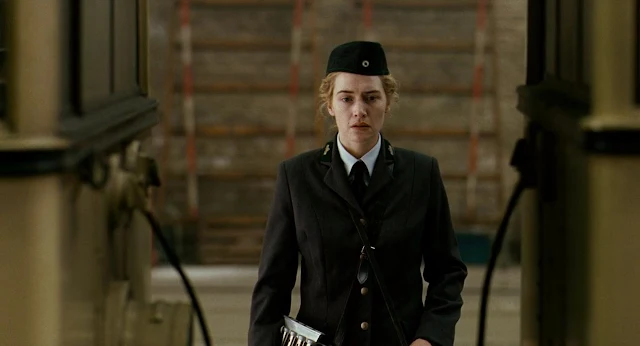 |
| James Gandolfini and Kate Winslet in Romance & Cigarettes |
Cast: James Gandolfini, Susan Sarandon, Kate Winslet, Steve Buscemi, Bobby Cannavale, Mandy Moore, Mary-Louise Parker, Aida Turturro, Christopher Walken, Barbara Sukowa, Elaine Stritch, Eddie Izzard, Amy Sedaris. Screenplay: John Turturro. Cinematography: Tom Stern. Production design: Donna Zakowska. Film editing: Ray Hubley.
Romance & Cigarettes is ... well, certainly unique. It's a marital/family drama with songs and dances, a sort of dramusical with an all-star cast of mostly non-singers. It has passionate advocates and a good number who dislike it. It was spottily released, first at the Venice and Toronto film festivals, then in the UK and Europe, but not in the United States until 2007, partly owing to disagreements among the various production companies, but also to the difficulty of marketing such an oddball movie. I happen to like it a lot, mostly because of the enthusiastic professionalism of its actors, who were called on to do things they don't usually do. James Gandolfini plays a construction worker named (no kidding) Nick Murder, married to Kitty (Susan Sarandon) but with a mistress named Tula (Kate Winslet). Nick and Kitty have three daughters: Baby (Mandy Moore), Constance (Mary-Louise Parker), and Rosebud (Aida Turturro), who serve as a kind of Greek chorus to the breakup that occurs when Kitty discovers a seriously raunchy love note (there's a lot of raunch in the movie) Nick has written to Tula. Things get heated, kicked off by a production number set to Engelbert Humperdinck's "A Man Without Love," that features garbage men dancing in the streets of Queens. And it doesn't let up from there, as actors lipsynch or sing along with singers like Bruce Springsteen, James Brown, Ute Lemper, Elvis Presley, and more. They also smoke a lot of cigarettes, and this half of the film's title precipitates the film's conclusion, which is probably its weakest part, as if writer-director John Turturro couldn't find another way to resolve the plot he has begun. Still, I welcome any movie that gathers a company as variously talented as Steve Buscemi, Christopher Walken, Elaine Stritch, and Eddie Izzard to support its superb leads. I have to single out Winslet in particular for giving another performance that demonstrates what a chameleon she is.

























